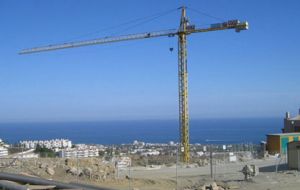MercoPress. South Atlantic News Agency
Spanish banks downgraded; Madrid announces 99 billion Euros rescue fund
 The collapse of the real estate market after years of intense lending affected banks.
The collapse of the real estate market after years of intense lending affected banks. Moody's Investors Service on Monday cut the senior ratings of 25 Spanish banks, citing expectations of further capital pressures. As well as broader economic pressures, the banks' asset quality indicators continue to point towards a further significant deterioration, Moody's said.
The non-performing loan rate had deteriorated to 4.27% at the end of the first quarter of 2009, up from 0.9% in December 2007 and 3.37% in December 2008.
“The extra cushion that banks had built up over the years against such risks -- which has so far protected their earnings and capital bases -- is becoming increasingly thin,” said Moody's analyst Maria Jose Mori.
Moody's cut the ratings of 18 banks by one notch and seven others by two notches after launching a review on the sector last month. The downgrades, which included several of the country's savings banks, were moderate due to expectations that the government would offer support if necessary, Moody's said.
Eight banks continue to have some or all of their ratings under review for further possible downgrade, including BBVA, whose long-term debt and deposit ratings remain at Aa1 for now but may be cut.
The ratings agency said pressure on capital has not been sufficiently addressed or resolved by Spanish banks.
“Unless some supportive measures are taken by third parties -- by owners, or likely by the government -- some banks' capital cushions will soon be affected by asset impairments and provisioning requirements,” Mori added.
The Spanish government reacted by announcing a bank rescue fund to the tune of 99 billion Euros which would allow it to take stakes in ailing savings banks.
“The fund will allow the State to temporarily buy holdings with voting rights” said Economy minister Elena Salgado Monday at a banking conference in Santander.
The government is hammering out the details of the fund, which it says will likely start with a war chest of 9 billion Euros, but may be expanded by as much as another 90 billion Euros if needed.
Spain's savings banks have been hit hard by the collapse of the property sector after years of intense lending to real estate developers and home buyers. Without access to private markets, they are limited as to how they may raise capital.
Local authorities have a strong presence on the boards of Spain's mostly unlisted savings banks, which critics say complicates potential mergers between the regionally focused institutions.
The Bank of Spain would determine how the public funds would be distributed within any troubled savings bank and the local authorities would not be permitted to veto mergers, Salgado said. The fund would only be used in emergencies.
“This fund would be a last resort,” she added. ”First, we would call on the banks to use private means to boost capital. Failing that, they would need to use the (private) guarantee fund. Only then would public aid be available.”




Top Comments
Disclaimer & comment rulesCommenting for this story is now closed.
If you have a Facebook account, become a fan and comment on our Facebook Page!